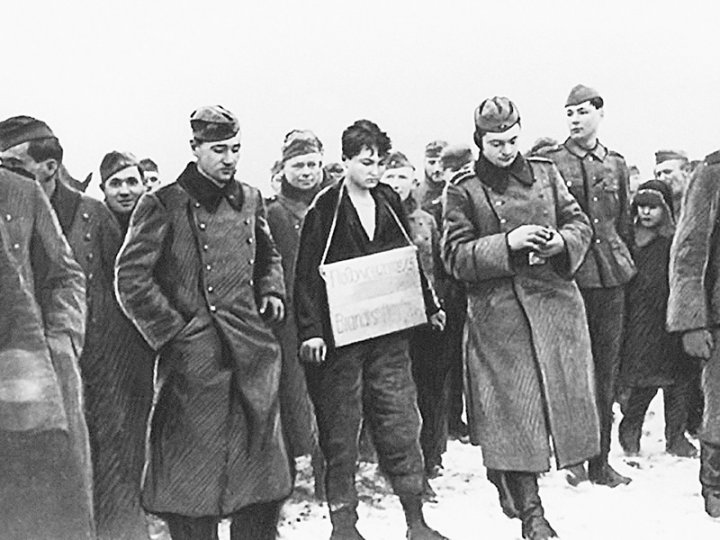On November 29, 1941, Zoya Kosmodemyanskaya, a teenage Soviet partisan, was executed by the Nazis. Her young age and gender, as well as her public execution, led Stalin to name her as a symbol of the role of women in the so-called “Great Patriotic War” against the German invasion during World War II.
Like millions of men and women, Zoya enlisted as a combatant in October 1941. Beginning in June of that year, the Soviet Union had been invaded by German troops amid profound disorganization of the Stalinist political and military command, which did not expect a breach of its nonaggression pact with Hitlerite Germany. The initial advance was so sudden that Moscow was in danger as early as September when the Nazis were close to invading the Soviet capital as part of “Operation Typhoon.” By October, German troops arrived within 100 km of a capital that had already begun its evacuation plans, and 18-year-old Zoya abandoned her studies at the Moscow Institute to join the resistance.
By December, the German advance into Moscow had been halted, but Zoya’s life took a different turn. At the end of November, she was assigned to a mission in Petrishevo, a village in a German-occupied area. She received orders to set fire to the village to sabotage the army as part of a “scorched earth” campaign, an ancient tactic established by Herodotus for the Persian-Scythian war of 514 B.C. consisting of razing every resource that the enemy can use in his advance.
Thus, in addition to mining roads and cutting lines of communication, Zoya and her fellow partisans began to burn houses and buildings occupied by Germans. But on November 27, Zoya was betrayed, and fell into German hands. For two days, she was savagely tortured, until on November 29 the Nazis arranged a public execution in the presence of the entire town. She was forced, in an old method of martyrdom and humiliation that was very popular in the European Middle Ages, to wear a sign that read “Houseburner” as she marched to the village center before finally being hanged. Before dying, she made a final display of bravery and, defying her executioners, shouted to her comrades:
Comrades, why are you so sad? I am not afraid to die, I am happy to die for my people […] You are going to hang me, but I am not the only one. There are more than 200 million of us, you can’t hang us all. My comrades will avenge my death. Germans, surrender before it is too late. Victory is ours.
Zoya’s story is not unique — it is part of a collective experience shared by millions who fought against the Nazi invasion with admirable courage in every Russian town and village, strengthening the power of the Red Army. It was on the basis of that heroic popular resistance, which cost more than 26 million lives, that Russia won the war.
Aware of Germany’s technical superiority, Stalin relied on the support of the masses in the war. However, at the risk of stirring up independent activity among the masses — something Stalinism, which had established a bureaucratic regime and condemned people to all kinds of hardships, feared like the plague — he did so by turning not to the values and victories of the revolution but to conservative imagery. He called on the reactionary idea of the defense of the “Russian motherland” which had characterized the imperial period when Russia dominated dozens of oppressed nationalities.
To consolidate this idea, upon reading Zoya’s story written by journalist Pyotr Lidov in the newspaper Pravda in February 1942, Stalin decided to name her “Hero of the Soviet Union.” He elevated her story to that of a legend, carefully crafting the meanings behind terms like “young,” “brave,” “woman,” “mother,” and “fatherland.” In his famous book Berlin: the Fall 1945, British historian Antony Beevor recounts that “A great number of Komsomol members still carried newspaper cuttings with a photograph of Zoya Kosmodemyanskaya, the young partisan ‘tortured to death by Germans.’ Many wrote ‘for Zoya’ on their tanks and aircraft.” Her figure was replicated on numerous monuments and used in various stories that propagandized the Great Patriotic War in the USSR.
Were it not a logical outcome of the reactionary policies of Stalinism to impose a sort of “religious ideology” to dominate the Russian people, it would be an irony of history that, in 2010, the Russian Orthodox Church received a proposal to canonize Zoya. The truth is that rather than being “inspired by God,” she was inspired by the cause of emancipation and freedom.
Originally published in Spanish on November 29 in La Izquierda Diario.
Translation by Otto Fors










